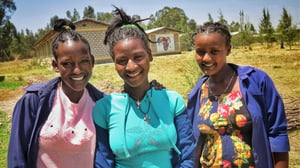 |
Jamaya High School is located in the Shashogo district of Ethiopia, 260 miles south of Addis Ababa. Built five years ago, the school serves 785 students, half of which are girls. The school had four latrines with no water for flushing or hand washing. Because of the poor hygiene and sanitation, many children suffered from excreta-related (human waste) diseases and missed regular classes. Menstruation sup-plies are often not available in rural areas and many parents cannot afford to buy them. A lack of prop-er facilities forced teenage girls to stay home when they experienced menstruation. Asked why the school infrastructure did not have the basic amenities, the school director said that the Education Bureau did not have the budget to address the dire need.
World Vision Shashogo Area Program drilled a borehole and provided Water, Sanitation, and Hygiene (WASH) services to the high school through its integrated approach. The well water is now serving the high school and the surrounding community. Water service was extended to a nearby health center through a new supply system. Water is now available in all the school latrines as well as the laborato-ries. “It’s incredible,” said Emebet. The service has improved educational outcomes and fostered bright and healthy schoolchildren. Emebet attends class regularly and works harder than ever, moving to the top student in her class this year. World Vision now provides Emebet and other teenage girls puberty education on menstruation hygiene. Girls have access to sanitary pads and pain relievers for menstrual cramps, along with rooms at the school where they can rest. World Vision is encouraging open discus-sion with parents, sisters, and fellow girls.
Providing safe water, sanitation, and educational services have bolstered attendance of girls at Jamaya High School. With determination, Emebet says, “I achieved what I have longed for and nothing will stop me. Now I feel that menstruation is a normal and natural process that one cannot avoid but [can] embrace as per the lessons I have learned by World Vision.” She is confident that her childhood dream of being a nurse will become real.







